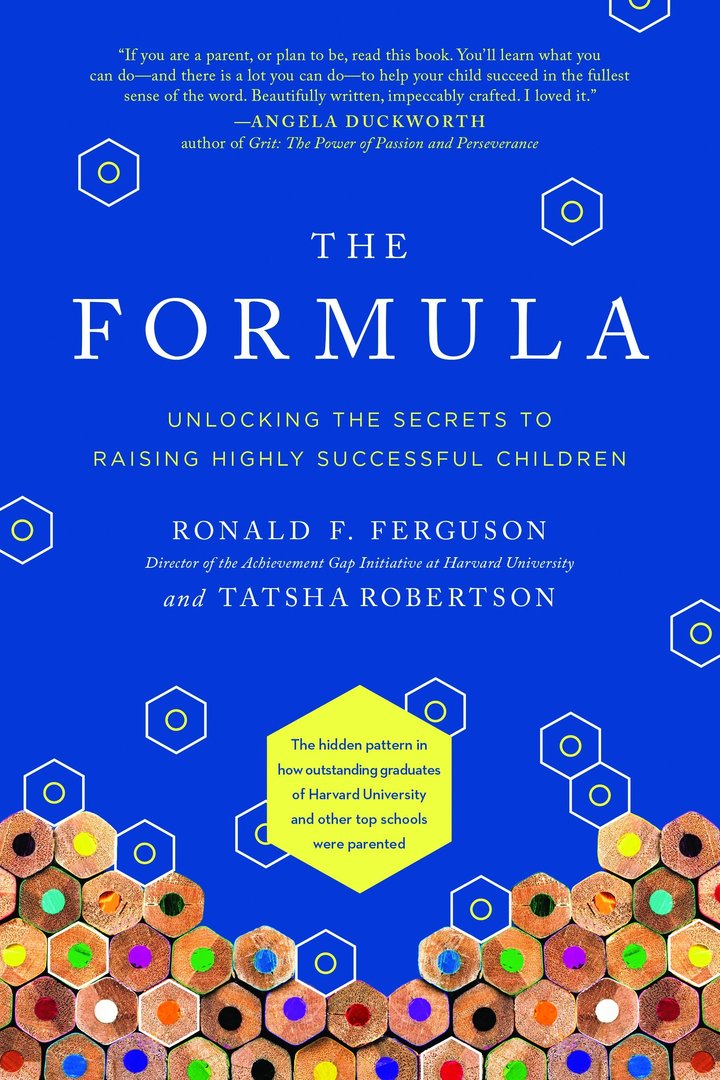[ad_1]
“When we encounter people who have experienced extraordinary success … we can’t help but wonder: How did they do it? Was it just natural talent? What transformed their natural-born abilities into extraordinary adult success?”
These are the questions journalist Tatsha Robertson began asking herself more than a decade ago as a national correspondent with The Boston Globe. Robertson noticed that many of the accomplished people she’d interviewed or profiled — individuals who’d achieved great academic or career success — had parents with seemingly similar traits.
Intrigued, Robertson called Ronald Ferguson, an MIT-trained economist who has made a career of studying academic disparities in the U.S. and serves as director of the Achievement Gap Initiative at Harvard University, to ask whether it is possible that strategic parenting is something that can be taught. And, if so, was it possible to give parents a blueprint for fostering their children’s natural talents to set them up for lifelong success — no matter their circumstances?
The answer, Ferguson said, was yes, and the two began working on what ultimately became their new book, The Formula — effectively, a set of eight different actions parents can undertake to help produce adults who are successful. Among the things they found? More often than not, the high achievers in the book could read before they went to kindergarten. And their parents had begun to envision who they’d like them to turn into as adults before they were even born.
HuffPost Parenting spoke with Robertson and Ferguson to find out more about their book.

To start with, can we clarify how you guys define “success” here?
Ferguson: We’re looking at parents who’ve figured out how to put their kids on track for achieving their greatest potential.
Robertson: These kids are mostly academically smart. And they have a sense of agency, so they have that sense of get up and go. And they were raised to have a purpose.
Ferguson: We have a little equation, it’s smarts + purpose + agency = fully realized.
A few of the roles you lay out here are time sensitive, especially the “early-learning partner” — which is basically the parent that is super hands-on in a really specific way from birth to age 5. The moms and dads you talk about in the book did things like use flashcards with their kids, and helped them learn to read before kindergarten. But what if you’ve got, say, a 4-year-old at home who can’t read yet and isn’t likely to anytime soon. Is the message basically… whoops? Too late?
Ferguson: The big thing really isn’t whether the 4-year-old can read. The big thing is whether the 4-year-old is hooked on learning. Whether the 4-year-old welcomes challenge. And parents can prepare for that by really knowing their child, and providing the level of challenge that inspires, but does not overwhelm. So the way I think about it is these “roles” are really about the parents’ mindset, and the parents being aware that these things matter.
There was zero coercion here. Some people think, “Why would you force your preschooler to read?” But there was zero forcing here. We make the point in the book that the child needs to be receptive. We’re not making the point that every child can be a superstar. We talk about this idea that parents have to be students of their children. Parents have to know each of their children well enough to know what the time and place are for any particular type of engagement or enrichment or activity.
Are there any of the eight actions or roles that so-called “master parents” play that you find surprising?
Ferguson: One of the roles we talk about master parents playing is “the philosopher.” People who have a strong sense of purpose have a clarity of mind when it comes to what the problems are that they want to help solve in the world. These parents took their children very seriously as thinkers from the earliest moments, so when they asked questions that might seem too advanced or philosophical for a little kid, these parents would think hard about it.
Robertson: To give you a quick example, there’s a young man named Sangu Delle from Ghana. He and his dad, who was a village doctor, would just talk in these really philosophical ways when he was 4 years old, 5 years old. Sangu would take baths, and for 10 minutes they’d just… talk. Sangu would ask him things like, “What is the most important virtue?” They’d talk about Aristotle. And the father would talk to him like an adult, and wouldn’t necessarily just answer the question right then. He’d go off, think about it for a day or two, and they would have a conversation.
In the book, you talk about families of multiple kids where one is super high-achieving and the other (or others) are not. How does that happen?
Ferguson: Sometimes, if you have one really high achiever in a family, the other children will decide [they] just can’t compete with that. So if parents are aware that might be a dynamic, they can help their children to whom learning might not come as naturally to understand they’re important, too. The other piece is that sometimes parents are really excited about that first child.
Robertson: We did speak with some families where all of the kids were high-achievers. What we found, in many cases, is that they parented each child differently. And they were able to get the best out of all of them. The parents were students of their own children, and they looked at them very differently and parented them very differently. One of the things we also know we’re going to hear is about time — parents saying they don’t have enough time. But the parents we spoke to for this book were very strategic and intentional about the time they had with their kids.
You make the argument, and I’m going to quote directly from the book here, that: “The expeditions toward realization and success on which each child was piloted were extraordinarily similar. Class doesn’t seem to matter. Race doesn’t seem to matter.” Isn’t that simply dismissing the systemic obstacles that hold kids back?
Robertson: Yes, there are going to be people who say that. But I say, what is wrong with saying despite those challenges, you must be intentional. Because other people are doing it. And if you want your child to succeed in life, you need to know this. It sounds like a cliche, but all these parents embraced the American dream — the idea that if you work hard, you can grow up to be anything. We heard these ideals — that American ethos — from parents, regardless of how much money they had or where they were from.
Ferguson: I don’t think either of us wants to take the burden off of society in taking responsibility to help these families. The question is whether we’re talking to the parent, or to society, and the book is addressing the parent specifically. But I want to say something back to society, too, which is that these parents deserve support.
Robertson: But the message really is that these are successful parents who knew something, which is be thoughtful and strategic. And determined! Don’t give up.
This conversation has been edited for clarity and length.
[ad_2]
Source link

